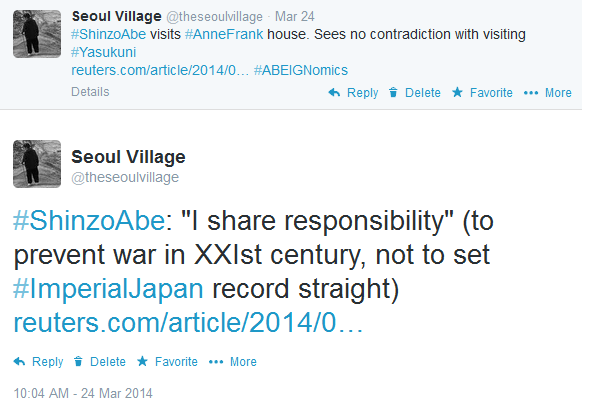 |
| All smiles: POTROK Park Geun-hye, POTUS Barack Obama, PMOJ Shinzo Abe |
POTROK Park Geun-hye, POTUS Barack Obama, and PMOJ Shinzo Abe did shake hands, seat at the same table, and trade speeches at NSS 2014*, but that was only one notch higher on the below zero thermometer of KOR-JAP relations compared to the previous informal exchanges between Park and Abe.
This picture captures more clearly the tension and forced smiles (even the candle holder, in the background, fearfully expects sparks to fly):
 |
| The few words in Korean Shinzo prepared for Geun-hye fell flat (see twitter timeline below) |
Park Geun-hye had the most to lose in a photo op that definitely allows Barack Obama the Peacemaker and Shinzo Abe the Pariah to score very useful points. North Korea and the Nuclear Security Summit 2014 provided the ideal alibi, but in order for something to happen, Shinzo Abe had to play to the gallery.
Japan's controversial Prime Minister did pledge not to touch to the Kono and Murayama Statements, but he already did that in the past, and there's no change whatsoever in his government's revisionist stance: the very day following this Tripartite Summitulacra, Education Minister Hakubun Shimomura confirmed his own rejection of the said statements**, and we know for sure these guys share the same views - Abe has always been an outspoken advocate of textbook revisionism.
For good measure, Abe visited before the meeting Anne Frank's house, where he said "I share responsibility"... but in yet another one of his trademark, nose-thumbing references to history (see twitter timeline below). That visit happened a few weeks after hundreds of copies of Anne Frank's Diary were vandalized in bookstores and libraries across Tokyo Prefecture - a form of textbook revisionism as shocking as but more mediatized than the institutional one.
If the Tripartite Summitulacra resonates like a diplomatic victory for Abe, it must have come at a price. The one he's paid since his latest Yasukuni visit has already been already quite heavy for a nation where face-saving is paramount: first the US expressed their "disappointment", then Ambassador Caroline Kennedy canceled her NHK interview (following outrageous remarks from its governor), and then a Seoul stop was added to Obama's trip to Asia, conveniently shrinking the first three-day State Visit of a POTUS to Japan since Clinton into a less significant stay.
If historic issues were neatly put aside for the Summitulacra, they are at the center of the discussions held between Korea and Japan ahead of that trip - obviously a prerequisite for Korea to accept the Hague meeting. Korea focuses on "Comfort Women", Japan tries to throw in territorial disputes for confusion. Of course, the former issue is the priority because of its universal reach. Furthermore, it's not about Japan v. Korea, and not even about Japan v. all the nations victims to that institutionalized sexual slavery system, but it's about post-war, democratic and peaceful Japan v. Imperial Japan.
I cannot imagine one second Obama avoiding historic issues altogether, and I'd be more than "disappointed" if he didn't devote a highly meaningful moment to this particular issue.
I wish this trip could also solve the North Korea conundrum, but I wouldn't bet a Won on it. TPP, OPCON transfer, Okinawa moves? Technical details. If this man has a chance to deliver one speech for the ages in the region in 2014, that's it.
Seoul Village 2014
Welcome to our Korean Errlines! Follow Seoul Village on Facebook and Twitter
Add this page to your favorites
* see "Remarks by President Obama, President Park of the Republic of Korea, and Prime Minister Abe of Japan" (US Embassy Seoul - 20140325)
** see "Japan’s rhetoric gets surly again" (Korea JoongAng Ilbo 20140328)
The twitter timeline around the Tripartite Summitulacra (excerpt):
 |
| Where we left things last time (see "KORUS chorus" - 20140318) |
 |
| Now it's up to Park Geun-hye to accept summit with Obama and Shinzo Abe. Will she accept to put history issues aside? #ABEIGNomics (20140320) twitter.com/theseoulvillage/status/446493174525984770 |
 |
| Japan and Korea discussing talks about Imperial Japan #sexslavery (NB: a condition for KOR-JAP-USA summit?) - 20140321 twitter.com/theseoulvillage/status/446940385177120768 |
 |
| First #ParkGeunhye-#ShinzoAbe meeting confirmed for The Hague next week. #Obama will hold the candle (20140321) twitter.com/theseoulvillage/status/446803200482344960 |
 |
| #ShinzoAbe: "I share responsibility" (to prevent war in XXIst century, not to set #ImperialJapan record straight) - 20140324 twitter.com/theseoulvillage/status/447901746245816320 |
 |
| Even harder for #Obama to have #ParkGeunhye and #ShinzoAbe meet than to have #Israel and #Palestine meet. + the rockets are fired from #DPRK! (20140324) twitter.com/theseoulvillage/status/448072415478697984 |
 |
| Historic handshake between war criminal grandson and dictator daughter (Nobel Prize winner observing) - 20140326 twitter.com/theseoulvillage/status/448630575683751937 |
 |
| #ParkGeunhye turned a deaf ear to #ShinzoAbe's "만나서 반갑습니다" ("nice to meet you") - 20140327 twitter.com/theseoulvillage/status/449049540348239872 |
 |
| Ahead of Obama's visit to Tokyo and Seoul, Japan and Korea to hold high level meetings in Washington next month twitter.com/theseoulvillage/status/449377577962971136 |






















